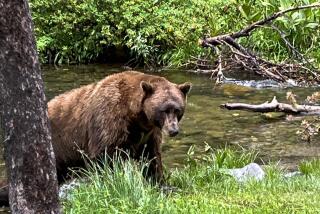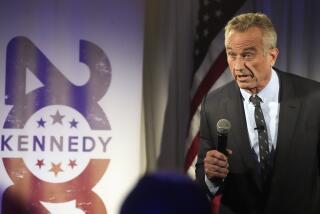Man, bears and a gruesome fate
“Grizzly Man” shows and tells an astonishing story, a disturbing and provocative tale of obsession, bravado and self-invention that leaves you open-mouthed for all kinds of reasons.
You will wonder at the vivid footage, mostly with massive bears but sometimes playful foxes, that Timothy Treadwell shot of himself interacting with animals during the last five of the 13 summers he spent camping out in an area he called the Grizzly Maze in the far reaches of Alaska.
Treadwell the man turns out to be even more complex and involving than his nature footage. Blond, handsome, charismatic, he styled himself, says documentary director Werner Herzog, as “the lone guardian of the grizzly,” someone who was convinced the love he’d created with the animals would protect him from their claws and jaws. “They can kill, they can bite, they can decapitate,” he says on camera. “But it will never be me.”
Yet in October of 2003, in an ending with so much of the awful inevitability of myth it made news around the world, it was him. The 46-year-old Treadwell and his girlfriend, Amie Huguenard, were killed and eaten by a grizzly in Alaska’s Katmai National Park and Preserve. In the final irony, his death led to the killing of members of the species he had sworn to protect.
This story of the powers and the limits of delusional thinking, of a man who truly felt that if you dreamed your dream hard enough you could bend reality to your will -- and who did just that for a surprising number of years -- is such a perfect fit for Herzog your first thought is that the filmmaker made up Timothy Treadwell, that he couldn’t possibly be real.
A veteran filmmaker who’s been making documentary and fiction films for more than 40 years, Herzog -- witness features like “Fitzcarraldo” and “Aguirre, the Wrath of God” -- has often gravitated toward driven individuals who’ve set themselves up against rationality, not to mention sanity. It’s no wonder that Les Blank’s documentary on Herzog is called “Burden of Dreams.”
Treadwell was not only exceptionally real, he also left behind 80 to 100 hours of footage he shot himself, and selections from the footage comprise about half of “Grizzly Man’s” running time. The rest of the film consists of interviews with people who knew and worked with Treadwell that examine the extent of his passion and his self-creation as well as offer a detailed look at the horrific circumstances of his death and of the bear that likely killed him.
What’s inescapable from the first moment we see Treadwell facing the camera is what a mesmerizing talker and supreme, tree-topping egotist he is, absolutely delighted to be playing the lead in the drama of his life. It’s not at all surprising to discover that, as an addictive personality who’d nearly died of a drug overdose, Treadwell transferred his addiction to bears, convincing himself that they needed help surviving and that he was the person chosen by the universe for that task. He says “I will die for these animals” so passionately and so often he sounds like a politician.
Like anyone profoundly sure of himself, no matter what their ideology, Treadwell gathered followers and supporters. Along with close friend Jewel Palovak, he founded an organization called Grizzly People, entranced large numbers of schoolchildren with his bear lore and appeared on David Letterman’s show, where the host asked him point-blank, “Are we going to read about your being eaten by one of these bears?”
What makes Treadwell’s crusade trickier is that it’s not at all clear his bears actually required protection. Undeniably he felt a kinship with the animals he returned to year after year, giving them nicknames like Mr. Chocolate, the Grinch and Sgt. Brown. And for reasons that will never be clear, perhaps a combination of the man’s undeniable fearlessness and God’s willingness to protect fools, the bears tolerated him in return.
Still, Herzog has said in off-camera interviews, “probably he needed the bears and the presence of the bears more than the bears needed him. Let’s face it, from a practical point of view, you do not protect the grizzly by standing 3 feet away from him.”
More than that, though the tapes promote the notion that he’s out there alone, Treadwell not infrequently had companionship, especially in the last years, of the woman who died with him, Amie Huguenard. Huguenard’s family chose not to cooperate with the film, and she remains a mystery even after reading “The Grizzly Maze,” Nick Jans’ strong new book on Treadwell, which offers considerably more information on her.
To many individuals interviewed in the film, moreover, Treadwell crossed a line by getting too familiar with bears, by treating them, as one man says, like “people in bear costumes instead of wild animals.” Herzog himself agrees with this theory, as does an Aleut museum curator who has a Harvard doctorate, emphasizing the notion that in “seeking a primordial encounter,” Treadwell in effect disrespected the bear and invited his own death.
Yet it’s hard not to be impressed, as Herzog himself very much is, with Treadwell’s perseverance and skills as a filmmaker, his documenting of what the director calls “human ecstasies and darkest inner turmoil.” A mating season battle between two bears is riveting, as are, for a completely different reason, shots of a baby fox fooling around with Treadwell on a tarp. Though Herzog takes a gratuitous swipe at organized labor when he calls his footage something “studio directors with their union crews could never dream of,” it is awfully impressive stuff.
Our attitude toward Treadwell, like Herzog’s, is a mediated mixture of horror and fascination. We’re intrigued to see video Treadwell shot of the bear that likely killed him but just as happy not to hear the audio record that exists, which the film does not include, of that fatal attack. It’s a tribute to the remarkable qualities of Herzog’s film that we are left uncertain just what we think of Timothy Treadwell.
Finally, though, as Jans writes in “The Grizzly Maze,” it is hard to escape the spooky feeling that “in the best 19th-century folk-song tradition,” the man did “indeed die in the arms of his own true love.”
*
‘Grizzly Man’
MPAA rating: R for language
Times guidelines: Graphic descriptions of fatal bear attack
Released by Lions Gate Films. Director Werner Herzog. Producer Erik Nelson. Screenplay Werner Herzog. Cinematographer Peter Zeitlinger. Editor Joe Bini. Music Richard Thompson. Running time: 1 hour, 43 minutes.
In limited release.
More to Read
Only good movies
Get the Indie Focus newsletter, Mark Olsen's weekly guide to the world of cinema.
You may occasionally receive promotional content from the Los Angeles Times.











